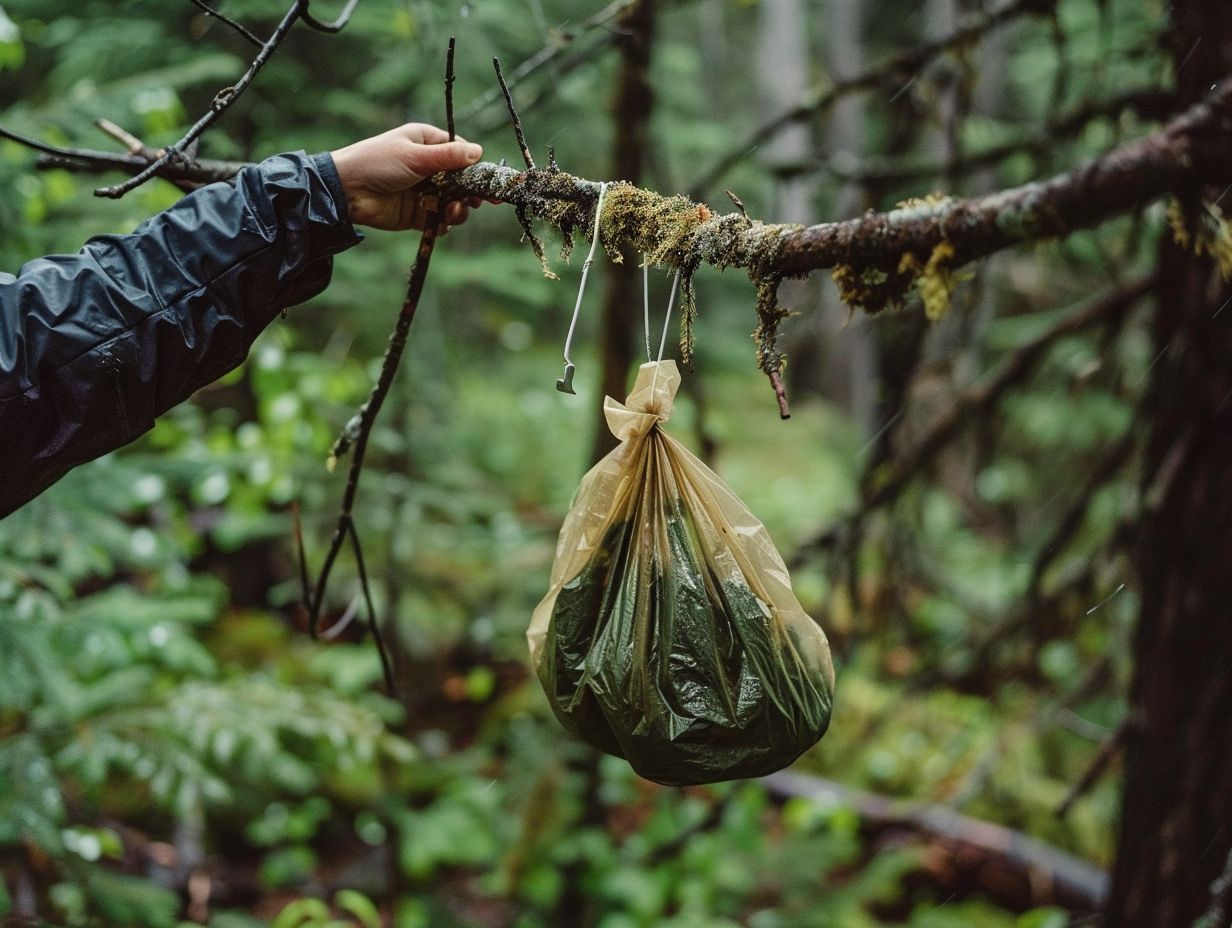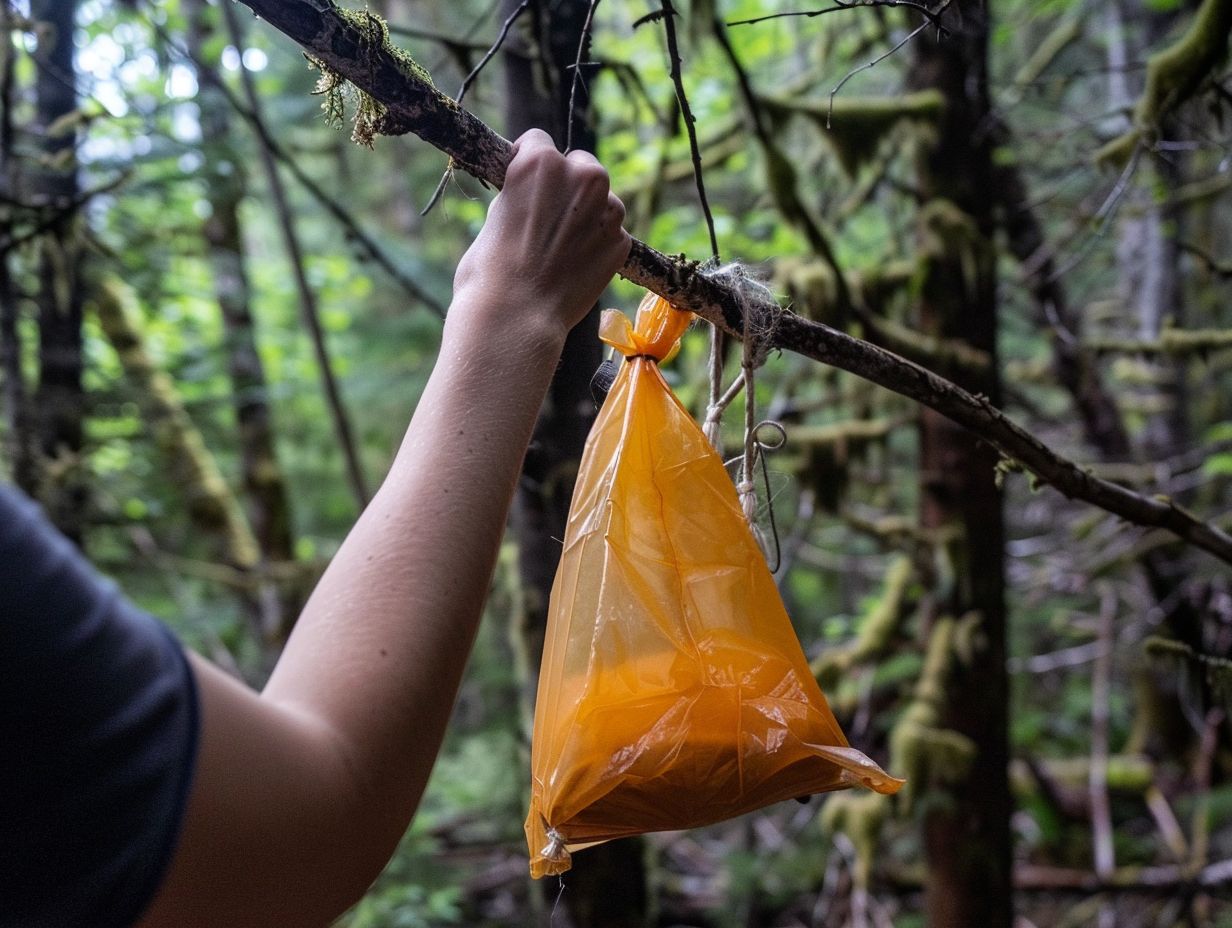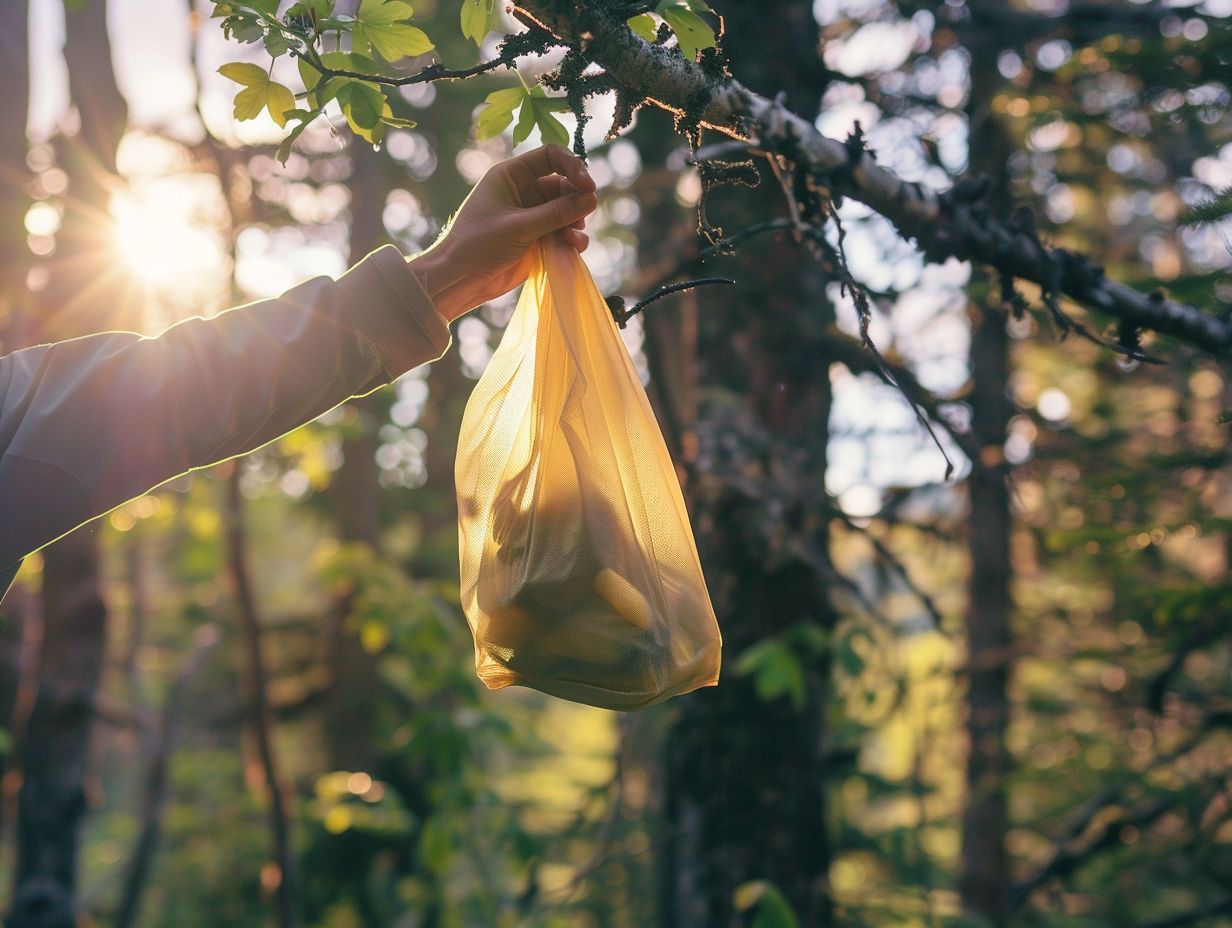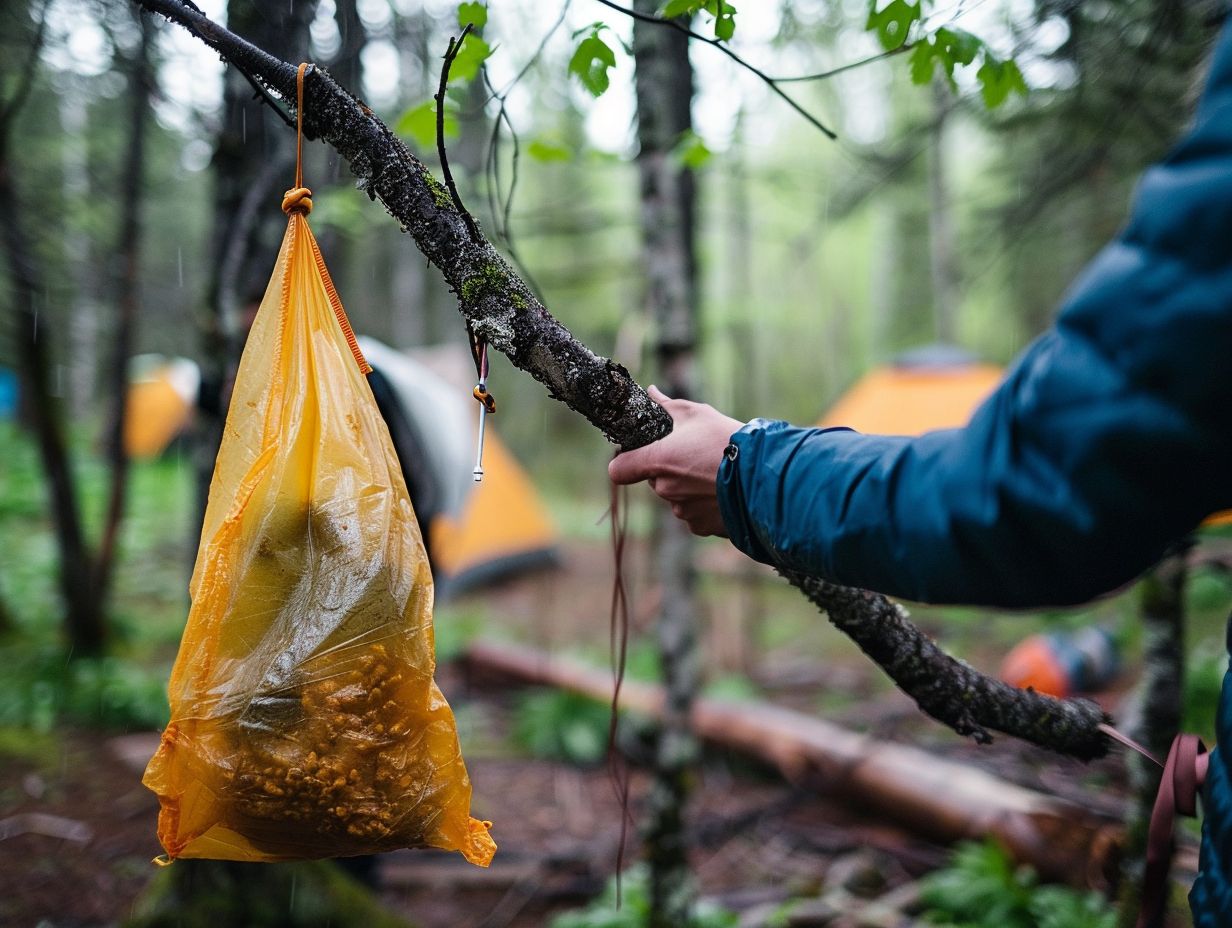Camping in the great outdoors can be a thrilling and fulfilling experience for you, but it also comes with its fair share of risks, especially when it comes to wildlife encounters. From potential dangers to preparing for your trip, setting up camp, and dealing with wildlife encounters, there are numerous factors for you to consider to ensure a safe and enjoyable camping experience.
This article will cover how to secure food from wildlife while camping and provide essential tips and guidelines to help you navigate the wilderness with confidence.
Key Takeaways:

- Properly researching local wildlife and regulations can help prevent dangerous encounters while camping.
- Packing appropriate gear and supplies for food storage can protect both campers and wildlife.
- Choosing a safe and secure location and properly storing food and garbage can greatly reduce the risk of unwanted wildlife visitors while camping.
Understanding the Risks
Understanding the risks involved in camping and food storage is crucial for a safe wilderness experience, especially when it comes to potential encounters with wildlife and critters. Being aware of the potential dangers associated with wildlife interactions can help you reduce the risk of conflicts and ensure your safety while exploring nature.
Implementing safe food storage practices, such as using bear-proof containers and keeping food items sealed tightly, is essential to prevent attracting animals to campsites.
Along with proper food storage, it is also important to avoid leaving food scraps or leftovers lying around, as they can lure wildlife closer to human habitation. By taking these precautions, you can minimise the chances of unexpected encounters and create a harmonious coexistence with the natural inhabitants of the wild.
Potential Dangers of Wildlife Interaction
One of the potential dangers of wildlife interaction, especially in bear country, is encountering predators like bears and other wildlife, necessitating the need for specific precautions and safety measures. These encounters can escalate quickly, leading to potentially life-threatening situations. Bears, in particular, are known for their strength and unpredictable behaviour, making any close interaction risky.
To minimise these risks, hikers and campers should always make noise while on trails to avoid surprising bears. In addition, storing food properly and using bear-proof containers can prevent attracting bears to campsites. Understanding bear behaviour, such as signs of aggression or stress, is crucial in knowing when to slowly back away without triggering a confrontation.
Preparing for Your Trip
Properly preparing for your camping or backpacking trip involves essential steps such as packing a bear canister, securing food items, and implementing effective deterrent strategies against wildlife.
One crucial aspect of your camping preparation should be to understand the significance of bear canisters. These specialised containers are designed to securely hold your food, preventing bears and other animals from accessing it. Placing all food items inside the bear canister, including snacks and toiletries with scents, is crucial to avoid attracting wildlife.
Storing the bear canister away from your sleeping area is essential to maintaining a safe distance from potential encounters. Plus using bear canisters, employing deterrents like bear bells or bear spray can further enhance your protection against wildlife interactions while camping.
Researching Local Wildlife and Regulations
Before setting off on your outdoor adventure, it is crucial to research local wildlife species and understand the regulations established by authorities such as national parks, Forest Service, or BLM stations. This step is essential to ensure compliance with guidelines and safety measures.
By conducting thorough research, outdoor enthusiasts can protect themselves and also contribute to the preservation of natural habitats and wildlife.
Wilderness areas may have specific rules that vary depending on the ecosystem and its inhabitants, underscoring the importance of being well-informed before venturing out. Authorities like national parks often offer educational resources on wildlife behaviour and safety tips to encourage responsible practices.
Adhering to these guidelines not only cultivates a deeper appreciation for nature but also helps minimise negative impacts on the environment.
Packing Appropriate Gear and Supplies

When preparing for your outdoor adventure, it is essential to pack appropriate gear and supplies. This includes a bear bag for food storage, sturdy rope for securing items, a reliable tent for shelter, and essential toiletries. These items are crucial for ensuring your safety and mitigating risks during your excursion.
Bear bags play a vital role in keeping food away from wildlife encounters, thus preventing potentially dangerous situations. Securing your gear with ropes not only prevents items from getting lost but also ensures the safety of both humans and animals.
Additionally, a reliable tent serves as your shield against unpredictable weather conditions, providing a safe haven in the wilderness. Carrying essential toiletries is equally important as it helps maintain hygiene, promoting a healthy camping experience and reducing the risk of infections.
Setting Up Camp
When selecting a suitable campsite, it is important to set up camp with essential safety measures such as a bear-proof cooler and bear spray. These precautions can significantly reduce the risk of wildlife encounters and enhance the security of your camping area.
Taking proactive measures to prevent unwanted wildlife interactions is crucial for ensuring a safe camping environment. This includes proper food storage to avoid attracting animals, maintaining a clean campsite, and disposing of waste properly.
By following these strategies, you can minimise the chances of encountering potentially dangerous situations and enjoy a peaceful and secure outdoor experience.
It is essential to remember that respecting the natural habitat of wildlife and practising responsible camping behaviour are key to creating a harmonious coexistence in the wilderness.
Choosing a Safe and Secure Location
When selecting a safe and secure location for your campsite, you should consider areas such as the Rocky Mountain National Park or the Pacific Northwest. It is advisable to consult with a knowledgeable river guide for insights on optimal camping spots.
These regions offer a wide range of options for camping enthusiasts, including tranquil lakeside settings and dense forests with abundant wildlife. The Rocky Mountain National Park is known for its stunning mountain views and well-maintained campsites, while the Pacific Northwest is appealing with its rugged coastline and ancient forests.
Experienced river guides can offer invaluable advice on choosing campsites near water sources, ensuring a convenient and enjoyable camping experience. It is important to prioritise safety, proximity to resources, and respect for nature when finalising your camping location.
Properly Storing Food and Garbage
Ensure that you properly store your food and rubbish away from critters by hanging them on a tree with a secure rope or taking necessary precautions. This will help maintain a clean and critter-free campsite.
This practice not only guarantees the safety of your provisions but also contributes to preserving the natural habitats of wildlife around your campsite. It is essential to utilise scent-proof bags or containers for food storage to minimise attracting unwanted attention from bears, raccoons, or other creatures.
Properly storing food and rubbish reduces the risk of animals becoming habituated to human food sources, which could have detrimental effects on their behaviour and ecosystem interactions.
Dealing with Wildlife Encounters
Understanding how to handle wildlife encounters, including predators, utilising bear spray correctly, and removing food remnants from the campsite, are essential strategies for avoiding hazardous situations and ensuring safety during your outdoor excursions.
- Bear spray is specifically formulated to deter aggressive wildlife encounters by creating a deterrent cloud that dissuades predators from approaching. By mastering proper bear spray techniques, you can effectively safeguard yourself in a non-lethal manner.
- Maintaining a tidy campsite devoid of food scraps and waste is vital in decreasing the chances of attracting unwelcome animal guests. Implementing these proactive steps not only reduces risks but also nurtures a harmonious coexistence with wildlife in their natural environments.
Reacting to Different Types of Wildlife

Reacting appropriately to different types of wildlife encounters, such as bears in the wild or mice in the Mojave, requires quick thinking and following guidelines from experts like the Forest Service for optimal responses.
- When faced with a bear in the wild, it is crucial to stay calm and avoid sudden movements. According to the Forest Service, you should back away slowly while speaking in a calm voice, letting the bear know you are human.
- In the case of mice sightings in the Mojave, take measures to secure your food and belongings to deter them. Keeping a tidy campsite can help prevent attracting these critters in the first place.
Preventing and Addressing Unwanted Visitors
You can enhance security and address unwelcome visitors at your campsite by using tools such as a parachute cord, Sea to Summit dry bag, or P-cord to protect your belongings and establish barriers against potential pests or wildlife intrusions.
These tools offer versatile solutions throughout your camping journey. The parachute cord, also known as paracord, is well-known for its adaptability and strength, making it an excellent choice for creating boundaries around your campsite or suspending items above ground level to deter curious animals.
Sea to Summit dry bags are designed to be watertight, ensuring that your food and scented items remain securely sealed and inaccessible to potential scavengers.
P-cords can be used creatively to secure your tent flaps or reinforce any weak entry points, discouraging unwanted creatures from gaining access. By using these tools effectively, you can maintain a safe and enjoyable camping experience.
After Your Trip
Completing your camping trip with responsible actions, such as cleaning up the campsite, following BLM station guidelines, and visiting iconic locations like Yellowstone, ensures a positive impact on the environment and future visitors.
Taking the time to properly dispose of rubbish and leftover supplies contributes to maintaining the natural beauty of the area and minimising harm to wildlife. Following guidelines set forth by organisations like BLM stations not only ensures your safety but also helps in preserving fragile ecosystems.
Exploring renowned destinations like Yellowstone allows you to appreciate the wonders of nature and reminds you of the importance of environmental conservation for future generations. Embracing these practices sets a precedent for responsible outdoor recreation and fosters a sense of stewardship for our public lands.
Cleaning Up and Leaving No Trace
Ensuring that you clean up after your camping trip and leave no trace in the campsite or wilderness area is essential to protect the environment and adhere to conservation guidelines for responsible outdoor practices.
By disposing of rubbish properly, such as picking up litter, not leaving behind food remnants, and properly extinguishing campfires, you contribute to preserving the natural habitats and preventing harm to wildlife.
Following these guidelines helps minimise the ecological footprint of outdoor activities, ensuring that future generations can also enjoy the beauty of these untouched landscapes. It is crucial to respect the environment and leave no trace, as it not only benefits the environment but also sets a positive example for others who visit these areas.
Frequently Asked Questions
What are some important steps to secure food from wildlife while camping?

There are a few essential steps to follow in order to secure your food from wildlife while camping. These include proper food storage, avoiding cooking and eating near your campsite, and properly disposing of any food waste.
Why is it important to secure food from wildlife while camping?
Securing your food from wildlife while camping is crucial for both your safety and the well-being of the animals. Wild animals are attracted to human food and may become aggressive or cause damage to your campsite in search of it.
What is the best way to store food while camping?
The best way to store food while camping is by using airtight containers or bear-proof canisters. These should be kept in a secure location, such as a locked vehicle or a designated bear box provided by the campsite.
How should I dispose of food waste while camping?
Food waste should be properly disposed of in bear-proof trash cans or by packing it out in a sealed bag. Never leave food waste in your campsite, as it can attract wildlife and create a safety hazard.
What should I do if I encounter a wild animal at my campsite?
If you encounter a wild animal at your campsite, remain calm and slowly back away without making any sudden movements. Do not run or approach the animal. Make loud noises to scare it away and alert other campers.
Are there any foods that should be avoided while camping to prevent attracting wildlife?
Yes, there are certain foods that should be avoided while camping, as they are more likely to attract wildlife. These include strongly scented foods, such as bacon, meats, and sweet treats. It is best to stick to more neutral smelling foods like grains, nuts, and dried fruits.



